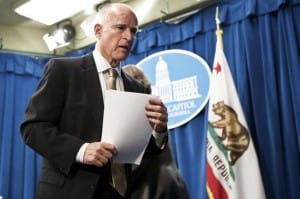Governor Brown scaling back support for high speed rail

Even though he strongly supported high speed rail (HSR) in his recent State of the State speech, Gov. Jerry Brown is now hedging that support. He says the cost will not be anywhere near $100 billion and that alternative forms of funding can be found. However, he’s not given much in the way of details as to how this might be accomplished.

The proposed HSR line between southern California and San Francisco was initially funded by a state bond initiative in 2008 for $9.95 billion. Construction has yet to start as determined NIMBYs, skeptical city councils, a blistering report from the state auditor, and more have all made the future of the project doubtful. However, the biggest problem by far is the cost. The original estimate was $33 billion. The current estimate is $100 billion.
The federal government was expected to fund much of it, but that’s almost certainly not going to happen. Federal funding for HSR has already been decimated and a California Republican member of the House plans to file an amendment to a transportation bill to specifically block any federal money being used for California HSR.
So, how does Gov. Brown plan to resuscitate HSR? First, he says the cost won’t be $100 billion because that’s way too high. Second, he wants to use cap-and-trade revenue to repay HSR bonds. Third, he proposes to speed up the construction to save on inflationary costs.
Inquiring minds want to know, just how Brown proposes to slash costs when everyone who has looked at the project says it’ll cost $100 billion? He’s not saying. But hoping something will be so does not make it so. Also, have you ever known a big public construction project to be completed on time and at budget? I didn’t think so. It’s pretty much a given that the final cost will be over $100 billion.
California’s new cap-and-trade program, whereby those who generate greenhouse gases pay a fee for doing so, is expected to raise substantial amounts of money, maybe billions. But as seemingly is always true of rosy projections of revenue in California, no one is quite sure if the money is actually there. Also, cap-and-trade is a tax by any other name and could raise costs for goods. Even worse, cap-and-trade has expected revenues of $500 million a year for the next three years. That’s hardly enough to finance high speed rail.
Speeding up construction would certainly save money in the long-term. But it means more money has to be spent now. California simply doesn’t have the money and has no apparent way to raise it, especially since public opinion has shifted sharply against the project, and financial projections say it will never make money.
California can’t borrow the tens of billions needed to finance HSR. It already has a crushing debt load. Any attempts to borrow that much would be at steep interest rates too, adding to the burden. Most of all, given California’s creaky infrastructure of roads, bridges, and water delivery, plus an educational system which badly needs revitalizing, California probably needs to put the money there and not into high speed rail.


